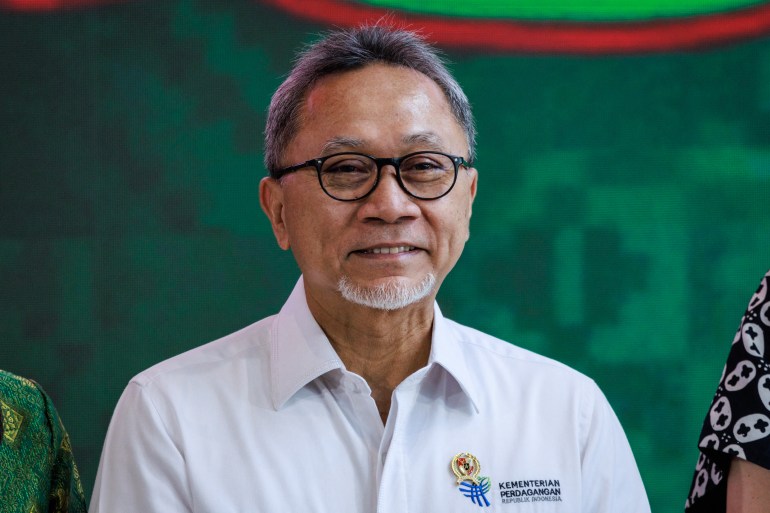Indonesia eyes hefty tariffs on China as businesses decry cheap imports

Medan, Indonesia – Siti Faiza has run Faiza’s Production House, a traditional women’s wear business, in Solo, Central Java since 2008.
Faiza started her own home business as a university student, designing and sewing clothes herself.
Faiza recruited some of her neighbors to help expand the company as sales began to increase. Today, Faiza’s Production House employs 12 tailors.
Still, Faiza says it is a struggle to compete with cheaper garments imported from overseas, particularly China.
“Sometimes I see imported clothes online at such low prices, like 40, 000 rupiah ($2.65). That would not even cover the cost of my fabric, Faiza told Al Jazeera. “I always wonder how the prices can be so low.”
Indonesia’s government has noted complaints by small-business owners such as Faiza, proposing tariffs of up to 200 percent on Chinese imports.
Zulkifli Hasan, the minister of trade, claims that small businesses are being threatened by “collapse” as a result of the US-China trade war’s surge of Chinese goods entering the country.
Indrawan, Faiza’s husband, told Al Jazeera, “I firmly support the tariffs, and I believe we should reject imports completely because they are destroying local businesses.”
“There is already a sizable local textile market in Indonesia. Why do we have to import anything”?
In June, thousands of workers in Jakarta protested against Chinese imports, prompting Hasan to propose tariffs to protect the country’s estimated 64 million micro-, small and medium-sized enterprises (MSMEs).
In remarks made to local media, Zulkifli said, “The United States can impose a 200-percent tariff on imported clothing and ceramics. We can do it as well to ensure our MSMEs and industries will survive and thrive.”
A wide range of goods would be affected by the proposed tariffs, including those for clothing and footwear as well as those for cosmetics and ceramics.
With two-way trade exceeding $ 127 billion last year, Indonesia’s largest trading partner, China, which could have a significant impact on both Jakarta and Beijing’s relationship with the proposed tariffs.
Jakarta has a history of intervening in the economy, the largest in Southeast Asia with a gross domestic product of more than $1.3 trillion, to support local industry.
Under outgoing President Joko “Jokowi” Widodo, who set the ambitious goal of raising gross domestic product (GDP) per capita to $25, 000 by 2045, Jakarta has pursued a model of “new developmentalism” that aims to foster rapid economic growth while shielding local businesses from competition, said Ian Wilson, a lecturer in politics and security studies at Perth’s Murdoch University.
According to Wilson, “Southeast Asian style developmentalism is a well-known model that emerged in the 1970s with a significant level of government intervention in the economy to promote a transition of labor, output, and exports from low productivity agriculture to higher productivity manufacturing sector and industrialization.”
“The immediate question, however, is what is the calculation in imposing tariffs of this kind”?
Although many local businesses have praised the proposed tariffs, economists have been cautious about the overall effects of such measures.
Siwage Dharma Negara, a senior fellow at the ISEAS-Yusof Ishak Institute in Singapore, said tariffs should be considered carefully.
“It might not be a desirable goal to just reduce imports. We need imports for raw materials and local industrial materials and, if tariffs are imposed, these industries will be affected”, he told Al Jazeera.
Negara argued that in addition to halting imported goods, the government should put more emphasis on supporting the growth of local businesses.
According to him, “businesses need to be helped to become more efficient and stronger, and the government needs to set clear goals.”
In contrast to Jakarta’s generally cordial relations with Beijing, which has spearheaded numerous infrastructure projects in the nation under the banner of its Belt and Road Initiative, the tariffs proposal also stands out.
Beijing was keeping tabs on the situation after the proposed tariffs were made public, according to Lin Jian, a spokesman for the Chinese Foreign Ministry.
China will take necessary steps to protect the legitimate rights and interests of Chinese companies, according to Lin. “China will closely monitor any tariffs Indonesia may impose on specific products.

Trissia Wijaya, a senior research fellow at Ritsumeikan University in Kyoto, Japan, said she did not think the planned tariffs would have a major effect on Indonesia-China economic cooperation overall.
According to Wijaya, “This can be traced back to the essential mineral trade volume that has been our relationship for the past few years, which is where we have been primarily engaged in our relationship,” Wijaya told Al Jazeera.
“The nickel supply is pivotal for China’s strategic interests. As long as the mainstay is not destroyed, I don’t think it would infuriate Beijing either as it is applicable to textiles, ceramics, and electronics”.
Faiza isn’t optimistic that tariffs will solve her business problems because she’s back in Solo.
We now live in an online world where people can purchase anything they want because the world is a free market today, regardless of whether they want to accept imported goods or not.
Source: Aljazeera
Leave a Reply